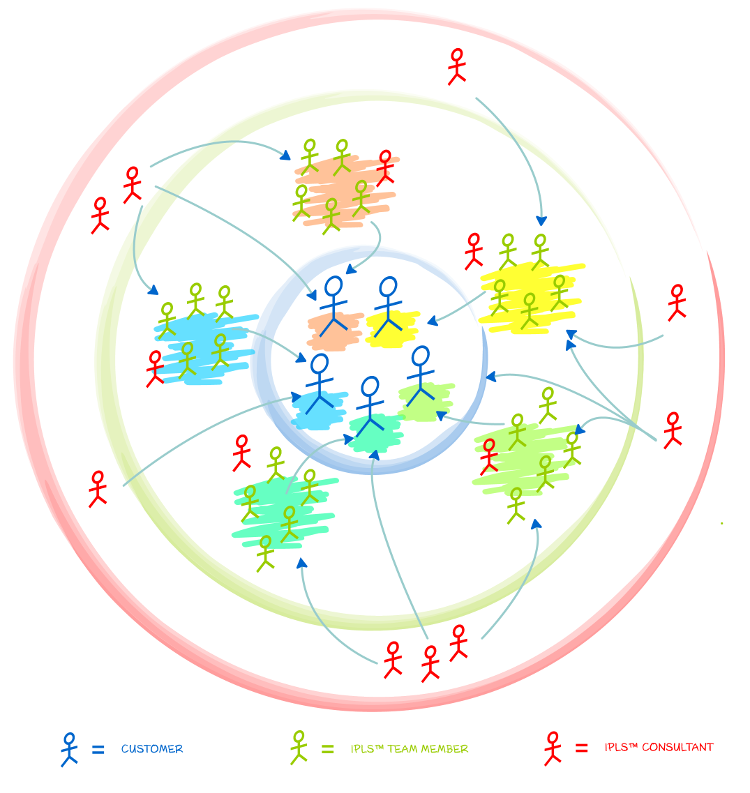|
IPLS™ stands for ‘Intelligent Power of Large and Small’ and combines the power of a large-scale ICT company and the power of a small start-up. Typically, a large-scale ICT company comes with structure, competence centres, well-defined processes, expertise and scalability, but often lacks flexibility, speed, ownership and entrepreneurship. A smaller, start-up ICT company comes with flexibility, an entrepreneurial mindset, speed and ownership, but often misses structure, multiple competences, clear processes and scalability.
IPLS™ merges the advantages of large and a small into one, resulting in a powerful, extremely flexible, scalable and highly efficient software development organisation. |

|
IPLS™ exists out of 5 major and integrated building ‘blocks’:
# 1IPLS™ customer centric development teams |
The first building block of the IPLS™ concept is a customer centric development team. The IPLS™ teams are the core of IPLS™ and exist out of ideally 4 to 5 developers and one dedicated tester. Each IPLS™ team is headed by a team lead who is the primus inter pares (the first among equals) of the team. An IPLS™ team is not set-up for one single project but works together for several years. As the team members are working together for a long period, they know each other’s strengths and weaknesses, resulting in a strong and intense collaboration. An entrepreneurial mindset, flexibility, ownership, accountability, and a close collaboration with the customer are driving and key factors of an IPLS™ team. As an IPLS™ team sees no boundaries in their commitment, they traditionally adopt an object in astronomy like a planet, a moon, a star, a nebula, … as its team name. Although an IPLS™ team acts like a small enterprise, it is not an island or acting on its own. The IPLS™ concept includes guidance and support from experienced IPLS™ consultants and strong and well-defined IPLS™ processes. And what about the IPLS™ teams and larger development projects requiring more than one team? For larger development projects IPLS™ combine multiple teams in the so-called IPLS™ development train based on SAFe. One team will take place in the locomotive leading the train and additional teams will be working in the connected wagons. A team in the dispatching, existing out of the customer, IPLS™ consultants and the team leads, defines the direction of the train and ensure the path to its destination can be reached without any obstacles and in the most efficient way.
|
# 2IPLS™ consultants |
The second building block of the IPLS™ concept are the IPLS™ consultants. To strengthen and broaden the entrepreneurial mindset and knowledge of an IPLS™ team, a group of experienced IPLS™ consultants supports and guides the IPLS™ teams.
|
# 3IPLS™ processes |
The third building block of the IPLS™ concept are well-defined, clear and lean IPLS™ processes. There are 2 types of IPLS™ processes: the non-negotiable and the flexible ones. The non-negotiable IPLS™ processes are followed by each IPLS™ team without exception, like e.g. security, release management, infrastructure, code reviewing, Git-use, naming conventions, coding standards, development environments, … Several of the non-negotiable IPLS™-processes are DevOps related. The flexible IPLS™ processes are also followed by each IPLS™ team but are eligible for adjustment and customization based on the specific project needs or customer interactions of the team. Flexible IPLS™ processes are often related to project management, human resources, and customer interaction. IPLS™ consultants are the guardians of the implementation of IPLS™ processes across an organisation. |
# 4IPLS™ development methodology |
The fourth building block of the IPLS™ concept is the IPLS™ development methodology. This methodology is based on Agile. The IPLS™ development methodology follows the core values and principles of Agile but is injected with and enriched by the positive and valuable elements of the classic Waterfall development methodology like focus on documentation and reliable time and budget estimates. |
# 5IPLS™ core values |
The fifth building block of the IPLS™ concept are the IPLS™ core values. IPLS™ embraces and rigidly encourages all stakeholders to follows the 6 IPLS™ core values:
|
